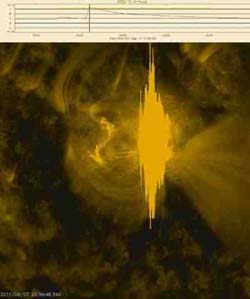Sunspot 1283 bristling with flares: An X1.8 and an M6.7

An X1.8 flare from Sept. 7, 2011, captured here with by the Atmospheric Imaging Assembly (AIA) on the Solar Dynamics Observatory (SDO). Credit: Credit: NASA/SDO/LMSAL/GOES<br>
The third came on September 7 at 6:36 PM ET, and was categorized as an X1.8 by the GOES spacecraft, making it the second X-class flare within 24 hours.
There was a coronal mass ejection (CME) associated with all three of the recent flares, but none of them are expected to travel directly toward Earth, and the first two were unlikely to cause aurora.
NASA computer models suggest that the latest CME may give a glancing blow to Earth on the morning of September 11, and might create some aurora.
The fourth flare from this same sunspot was detected by GOES at 11:36 AM ET on September 8. This was an M6.7 flare, considered moderate.
Media Contact
More Information:
http://www.nasa.govAll latest news from the category: Physics and Astronomy
This area deals with the fundamental laws and building blocks of nature and how they interact, the properties and the behavior of matter, and research into space and time and their structures.
innovations-report provides in-depth reports and articles on subjects such as astrophysics, laser technologies, nuclear, quantum, particle and solid-state physics, nanotechnologies, planetary research and findings (Mars, Venus) and developments related to the Hubble Telescope.
Newest articles

Combining robotics and ChatGPT
TUM professor uses ChatGPT for choreographies with flying robots. Prof. Angela Schoellig has proved that large language models can be used safely in robotics. ChatGPT develops choreographies for up to…

How the Immune System Learns from Harmless Particles
Our lungs are bombarded by all manner of different particles every single day. Whilst some are perfectly safe for us, others—known as pathogens—have the potential to make us ill. The…

Biomarkers identified for successful treatment of bone marrow tumours
CAR T cell therapy has proven effective in treating various haematological cancers. However, not all patients respond equally well to treatment. In a recent clinical study, researchers from the University…





















